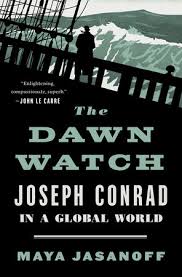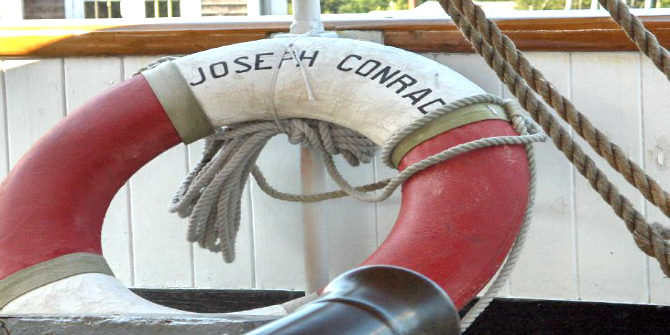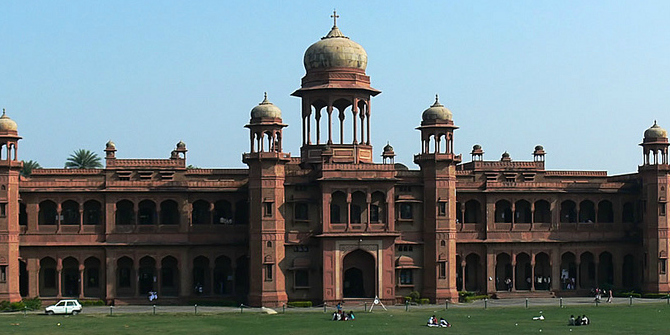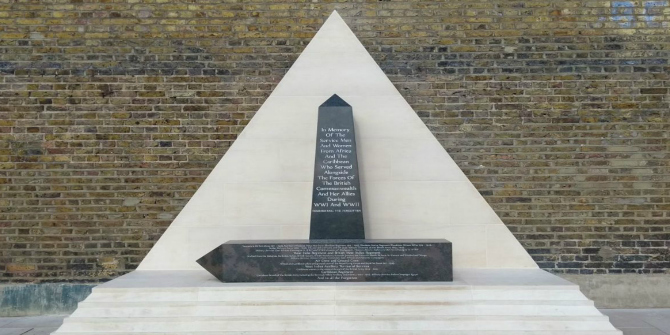In The Dawn Watch: Joseph Conrad in a Global World, Maya Jasanoff argues that novelist Joseph Conrad’s life and works evidence a global world in the making at the end of the nineteenth century. Padraic X. Scanlan praises this as an impressive experiment in the genre, but asks: without fully contending with the racist imaginary that shaped much of his work, can we so seamlessly embrace Conrad as ‘one of us: a citizen of a global world’?
The Dawn Watch: Joseph Conrad in a Global World. Maya Jasanoff. Penguin. 2017.
At the end of the nineteenth century, many Western intellectuals agreed that the preceding 100 years of mass migration, technological change, population explosion and political transformation were pushing humanity towards a reckoning. Some, like the American preacher Josiah Strong, imagined that ‘the warm breath of the Nineteenth Century’ had revived ‘a living soul under the ribs of death’. To others, the turn of the century portended apocalypse, not paradise. ‘Civilisation’ seemed to be making people and nations sick and crazy, isolated, neurotic and overstimulated. We still live in the nineteenth century: making sense of the tense, crowded present begins with understanding the blend of violent chauvinism and aching self-doubt that characterised ‘Western civilisation’ in the decades before the First World War.
In her smoothly written and ingeniously constructed new book, The Dawn Watch: Joseph Conrad in a Global World, Harvard historian Maya Jasanoff offers the life and work of the novelist Joseph Conrad as a tool with which to untangle the railroads, steamship routes and telegraph cables that made the world smaller in the nineteenth century. Born Józef Teodor Konrad Korzeniowski in 1857 to Polish nationalists in exile in imperial Russia, Conrad spent the first 40 years of his life as a young immigrant in London and as a sailor in the French and British merchant marines. In the late 1890s he settled permanently in England and began his career as a novelist. Conrad’s personal history and geography, from Russia to the Congo, Jasanoff argues, shows a ‘global world’ in the making: his fiction offers a meditation on coping with that new world. Since most of Conrad’s papers are from his writing life, Jasanoff finds Conrad’s maritime life by triangulating between archival records, broader historical contexts and four of his most famous novels, The Secret Agent, Lord Jim, Heart of Darkness and Nostromo, published between 1899 and 1907.
Dawn Watch is an experiment in genre. ‘If looking at Conrad’, Jasanoff writes, ‘opens up a history of globalization from the inside out, approaching him as an object of history has let me shape a biography from the outside in’. This echoes a moment early in Heart of Darkness, as the narrator prepares to relay the main action of the novella, a yarn told by Charles Marlow, a British sailor (and recurring character in Conrad’s fiction). Sailors’ tales, the narrator explains, are usually simple – but not Marlow’s. ‘To him’, the narrator continues, ‘the meaning of an episode was not inside like a kernel but outside’. This echo is typical of Dawn Watch, which cleverly mirrors Conrad’s tendencies to mine his own experiences in his fiction, as Jasanoff uses Conrad’s fiction to reconstruct his experiences.
Jasanoff illustrates the cosmopolitanism, energy and diversity of the British world in the late nineteenth century. She emphasises that although Conrad might be caricatured as a British sea novelist, none of his novels take place in British colonies, and the novels Conrad set in Britain itself focus on people who were not ‘ethnically’ British. As an émigré Pole in London, Conrad was part of an enormous population of naturalised new Britons in the capital, washed up on the shores of an island that – at the time – welcomed political refugees from across Europe. As a sailor in Southeast Asia, Conrad worked on the Vidar, a British-built ship owned by an Arab tycoon with offices in Aden, Jeddah, Suez and Singapore and crewed by sailors from across the empire. Jasanoff maps a dynamic nineteenth-century world that looks very different from the familiar ones of the era, with their hardening borders.
Conrad’s psychological struggles intertwined with his global life. He brooded on the idea of the universe as amoral, incomprehensible and determined, and on ideology as an insincere cover for the exercise of power. His novels often focus on individuals in crisis discovering that their sense of free will was a self-deception. As Conrad told Bertrand Russell, no idea was powerful enough to ‘stand against [his] deep-seated sense of fatality governing this man-inhabited world’. In Lord Jim, Marlow barks, ‘Hang ideas!’, and pleads instead for ‘a few simple notions you must cling to if you want to live decently’. Jasanoff reconstructs Conrad’s love of the sea as his way of coping with this existential dread. A sailing ship caught the wind: it harnessed a power beyond human control to move where it could, but was, in the end, at its mercy. And yet, the inauthenticity of ‘ideas’ tormented Conrad. In his youth, he attempted suicide by shooting himself in the chest. Later in life, he was so prone to fits of exhaustion that one of his sons, as a toddler, played at ‘being ill’ in imitation. In Nostromo, the dandy-turned-revolutionary Martin Decoud is marooned on a desert island. As he waits for rescue, Decoud begins to finds his individuality ‘merged into the world of cloud and water, of natural forces and forms of nature’. Decoud shoots himself in the chest, and unlike Conrad, Decoud doesn’t miss.
Jasanoff promotes Conrad as a kind of cranky, eccentric progressive in comparison with many men of his era – anti-colonial, if not anti-racist. However, she – like her subject – is taken with the idea of the world ‘beyond the telegraph cables and mail-boat lines’, a famous line from Lord Jim, uttered by Marlow, where ‘the haggard utilitarian lies of our civilisation wither and die’. Jasanoff makes a point, in the opening of the book, of recounting her travails in getting to the Democratic Republic of Congo, and in arranging passage on a boat down the Congo River, in order to find Conrad by re-enacting the author’s most famous voyage. Like Conrad, she hoped to go ‘beyond’ and come closer to an authentic experience of the ‘wild’ places beyond the pale of the ‘civilised’. ‘The world’, Jasanoff writes, ‘is made up of ‘‘nowheres’’ and ‘‘somewheres’’’. She allows that ‘which counts as which depends on what ‘‘where’’ you look from’. And yet, Dawn Watch rarely offers a view from ‘nowhere’ that isn’t Conrad’s. Jasanoff floated down the Congo River on a barge delivering Primus Beer, a popular brand in the DRC. In an essay on the trip, published in the New York Times, Jasanoff describes a visit to Bumba, a town on the river. ‘In the colonial era’, she writes, ‘this used to be somewhere’. But for whom? Bumba is off the electrical grid, but it has more than 100,000 residents. The geographies made by colonialism are not neutral: Conrad’s (and Jasanoff’s) thirst for adventure has a politics that is left unexamined in the book.
In Heart of Darkness, Marlow watches African villagers dance on the banks of the river as his steamship putters by. ‘They howled’, he remembers, ‘and made horrid faces; but what thrilled you was just the thought of their humanity’. At the Inner Station, deep in the jungle, Marlow finds the cultivated and eloquent but ghoulish and emaciated Kurtz, an ivory dealer worshipped as a god and garlanded with the shrunken heads of his victims. To Marlow, the ‘natives’ are nearly animal, while Kurtz has been twisted by the power to command claimed by European empires and by the perverse contradictions of the ‘civilising mission’. Marlow is troubled by his kinship both with the ‘prehistoric men’ of the riverside communities and with Kurtz and his ‘abominable satisfactions’. To Jasanoff, Marlow’s unease points to what she takes as a progressive critique of imperialism. It wasn’t, she writes, ‘that ‘‘savages’’ were inhuman, it was that any human could be savage’. ‘Anyone could be a savage […] everywhere could go dark,’ she writes elsewhere. Jasanoff’s characterisation of Conrad’s views echoes one of the basic premises of colonial and imperial chauvinism – of ‘savagery’ as darkness and ‘civilisation’ as light. Marlow sees the African villagers as representatives of an imaginary ‘prehistory’ – ignorant and animal, but morally innocent. He sees Kurtz as prone to ‘savagery’ – with all of the violence of putatively prehistoric, pre-civilised man, but with all the guile of civilisation.
Conrad allowed that the Africans and Malays who worked alongside him were human, and he saw in their ‘savagery’ a release from the hypocrisies and constraints of civilisation. What he felt at sea – at work, at peace – he imagined ‘savages’ felt all the time. Jasanoff admits that she ignores Conrad’s literary influences and relationships. But this editorial decision also excludes a great deal of the intellectual and cultural atmosphere that Conrad breathed. Conrad was obsessed with interior life, but Sigmund Freud is absent from the Dawn Watch; Conrad brooded on uncaring natural forces shaping human life, but Charles Darwin, his followers and critics are left waiting in the wings. Jasanoff lauds Conrad’s preoccupation with fate as a defiant rejection of liberal belief in the autonomy of the individual, but Conrad lived in a time when natural historians and social scientists fretted over evolution: eugenicists hoped to engineer a ‘better’ human race and criminologists wondered what use it was to ‘deter’ criminals who might be fated to commit crimes.
In The Secret Agent, the sinister diplomat Mr Vladimir smirks remembering an ambassador who exclaimed on his deathbed, ‘Unhappy Europe! Thou shalt perish by the moral insanity of thy children!’ Conrad’s sense of ‘civilisation’ as a kind of maddening fraud was widely popular among Victorian psychologists and anthropologists, who feared that only the civilised could be ‘morally insane’ – that is, capable of acts of ‘savagery’ without the exculpation of ‘savage’ innocence. The leading Victorian psychiatrist Henry Maudsley acknowledged (like Conrad) that ‘the lowest savage and the highest saint belong to the same human kind’, but suggested that culture and morality were arranged on a continuum from ‘savagery’ to ‘civilisation’. ‘A low savage’, Maudsley wrote, ‘in civilized society must needs fare almost as badly as a carnivorous animal would fare in a land of herbivorous animals which it was forbidden to eat’.
In The Secret Agent, the police informer Mr Verloc’s brother-in-law, the cognitively impaired and childlike Stevie, overhears Verloc’s revolutionary circle discussing the ‘cannibalistic’ tendencies of the upper classes, and takes talk of the rich drinking ‘the warm blood of the people’ literally, collapsing to the floor in terror. Stevie, incapable of understanding metaphor, has a kind of ‘savage’ innocence himself, which leads him to his death in a failed attempt to blow up Greenwich Observatory. Of the novels Jasanoff explores, The Secret Agent is the most overtly engaged with European politics, turning the fulminating anarchism and socialism of the late nineteenth century into dark comedy. The joke, in the end, is that politics is a thin film over animal instincts and the raw exercise of power. Stevie, in the eyes of the revolutionist and former medical student Ossipon, is a degenerate, ‘most interesting to study […] a perfect type in his way’. To Ossipon, he seems physiologically murderous; to Conrad, Stevie has the innocence of a ‘prehistoric’ man, complete, fragile and easily lost.
Conrad criticised colonialism and exploitation, but refused to add his voice to public campaigns organised in opposition. He was sceptical of all ideology. ‘The only prescriptions Conrad wrote were for individuals,’ Jasanoff observes. But in the end, there is no getting around Conrad’s racism – it is screamingly obvious and unapologetic, and any account of Conrad’s work has to reckon with the way a particular racial animus, a twinned envy and contempt, shaped his artistic legacy. Anti-colonial sentiment was not anti-racist sentiment. Non-white, non-European characters in Conrad’s fiction are treated as undifferentiated, depersonalised, without the individuality of the ‘civilised’. Conrad assumed that because Europe seemed to be moving too fast, it meant the rest of the world wasn’t moving at all.
Conrad’s novels play with unreliable narration and inner monologue, but allow it only to ‘civilised’ characters. Conrad’s ideas about ‘civilisation’ and psychology give him license to deny interiority and individuality to ‘savage’ characters. In Almayer’s Folly, his first novel, Conrad describes the consciousness of an enslaved woman in Borneo, in whose mind ‘lay useless and barren the seeds of all love and of all hate’. Conrad describes ‘her half-formed, savage mind, the slave of her body—as her body was the slave of another’s will’. Jasanoff glosses this passage as Conrad’s attempt ‘to enter the mind of a slave herself’. But what Conrad does in this passage is precisely to deny to the enslaved woman the self-doubt and complexity he allows to European characters.
Ultimately, Jasanoff writes that she finds common cause with Conrad because ‘he was one of us: a citizen of a global world’. She sees problems of the present – terrorism, inequality, exploitation, ultra-nationalism – in Conrad’s novels. Dawn Watch is a daring experiment in entering the mind and world of a troubled and troubling artist, and an impressive book. And yet, history and fiction don’t flow together as neatly as Jasanoff would have it. Writing a global life from inside out and outside in may make it too easy to treat the progressive Conrad as prescient and to excuse the reactionary Conrad as a man of his time.
Note: This review gives the views of the author, and not the position of the LSE Review of Books blog, or of the London School of Economics.
Image One Credit: (Dean+Barb CC BY 2.0).
Image Two Credit: Postage Stamp, 1903 (John Flannery CC BY SA 2.0).


 Find this book:
Find this book: 







many thanks, sounds like i’d really enjoy this.
does it say anything about his relationships with the other ethnic groups in the Polish Borderlands (The Kresy)
As I understand it, Conrad did campaign publicly, alongside Roger Casement and others, against the belgium Congo atrocities. Is this incorrect?
Hi Michael – thank you for your query. I checked with the reviewer of the book and he informed me that Maya Jasanoff argues throughout the book that while Joseph Conrad was appalled by the atrocities and knew Roger Casement well, he was deeply uncomfortable with Casement’s approach to public campaigning and profoundly uncomfortable with institutions of all kinds. He preferred to emphasise individual agency over collective action and had a jaundiced view of political parties and campaigns in general. As noted in this article (http://www.jstor.org/stable/3831276), he did publish one letter in sympathy with Casement’s campaign. However, he was not prominently associated with it, and did not wish to be, and he therefore did not campaign publicly with Casement – Rosemary Deller, LSE RB Editor